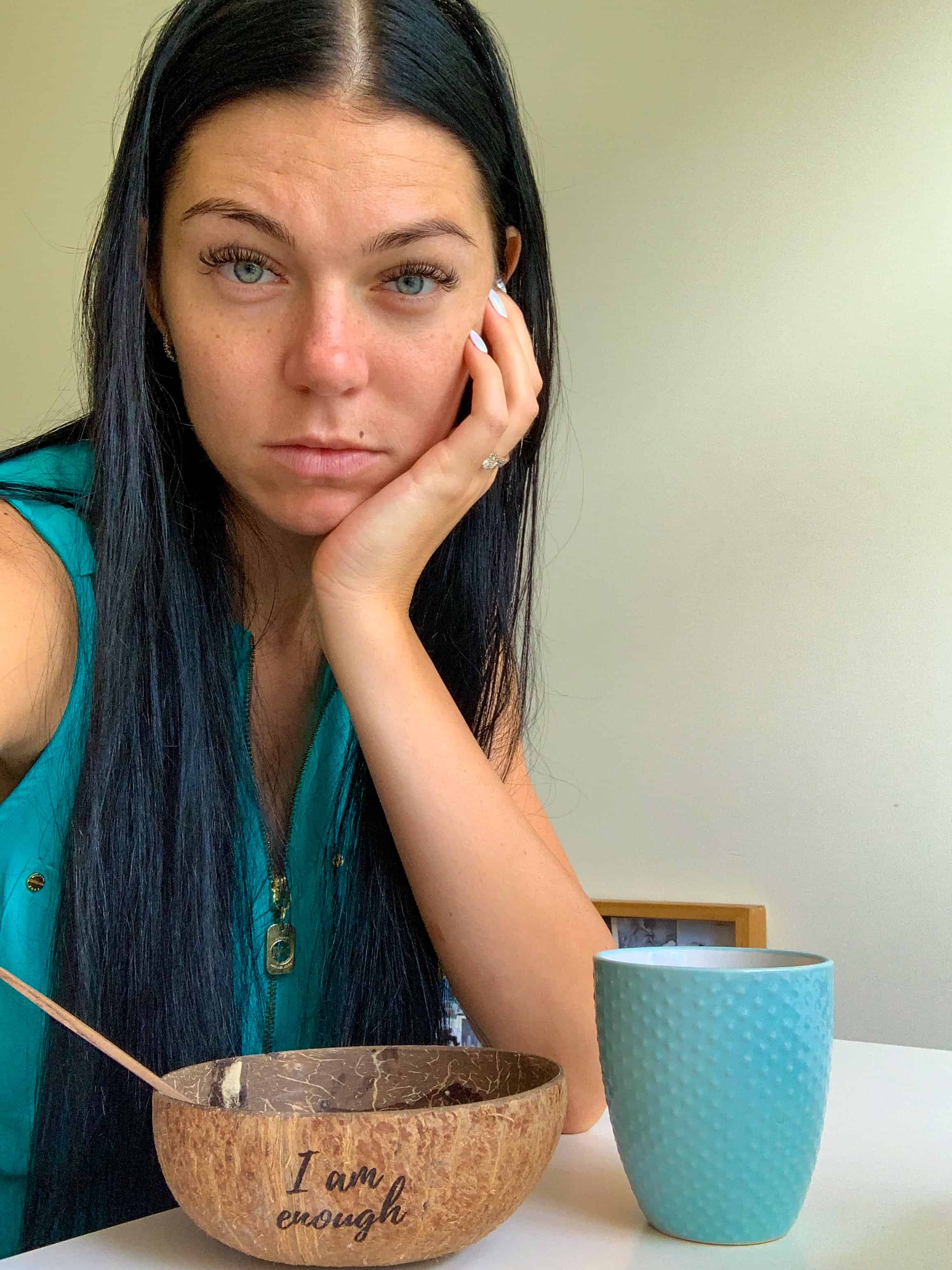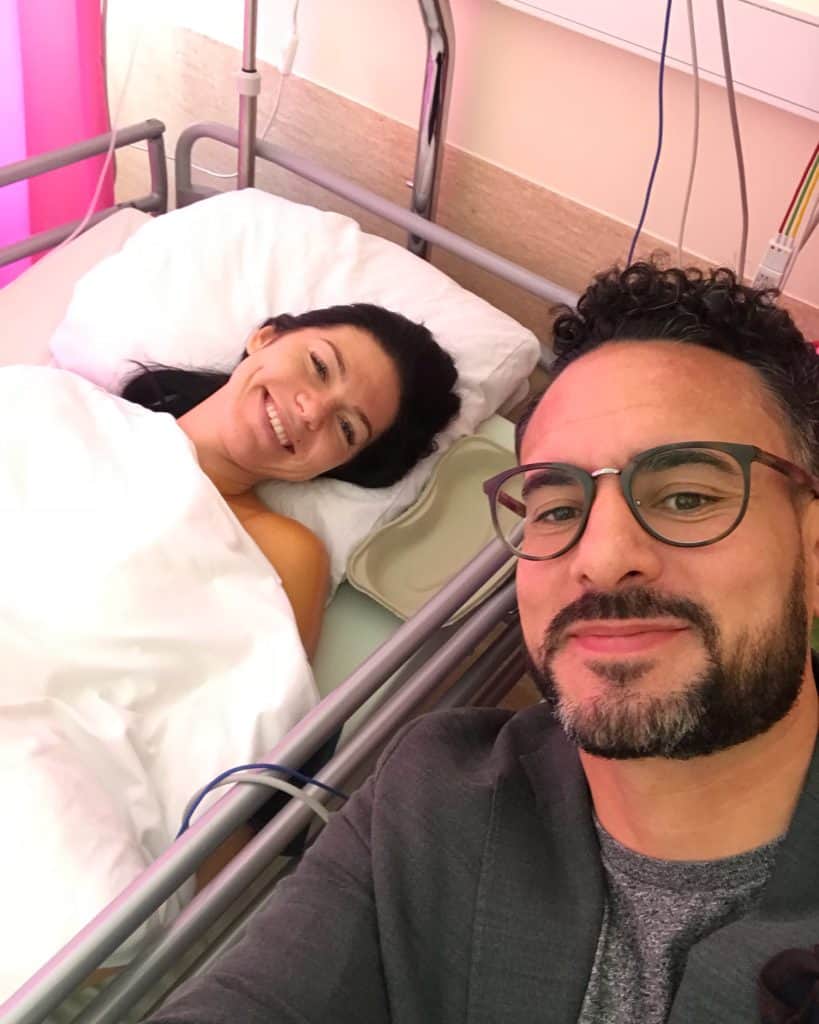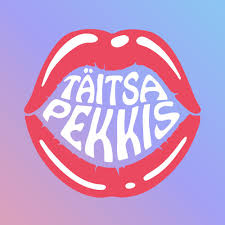2020 book reviews part 1
July 07, 2020
As I shared in my 2019 book review- 2 years ago I would have never imagined writing book summaries, because quite frankly- reading books was something I didn´t do. I believe that reading is one of those things though that the more you do it persistently, the more your appetite grows.
My appetite has definitely grown (metaphorically AND literally because of being pregnant:D), so instead of waiting until the end of the year and writing the longest blog post the world has seen, I decided to do the half-year summary.
Last year I finished my 20th book exactly on the 31st of December and set my low goal for this year at 21, the high goal at 24 (2 books a month). It is July and I´ve finished 25, so today I´ll write the overviews of the first 20.
It seems that Corona- time and quarantine pushed a lot of people to pick up books, but many of my friends have said that it hasn´t stayed a habit. It´s easy to say- "Well, now I just don´t have time for it again." I believe reading is never something you just have time for. Nothing is. You just MAKE time for it if that is important enough for you.

So here are some ideas that have helped me stay consistent with the habit and hopefully will help you too:
- Time-efficiency with audiobooks
I listen to an Audiobook and read a physical book usually at the same time. Often times I combine some kind of activity with listening to audiobooks. For example, when I go on my walks, I always have headphones in my ears. When I clean on the weekends, often for multiple hours, I mostly listen to something at the same time. Trust me- washing floors becomes much more fun when a good book is playing;) When I have to drive to a further destination and am alone in the car I frequently pop an audiobook on. During those times I give myself permission to fully be in that moment so that the focus from listening doesn´t shift.

- A specific time for physical books
I personally read physical books before going to bed. Some days less, some days more pages, but always at least a few. Even reading one page a day will get you further than none. Some people read in the mornings and that works great for them. Whenever is a better time for you, commit to it. If it is in the " I´ll do it at some point during the day" category, then the likelihood of it happening is very rare.
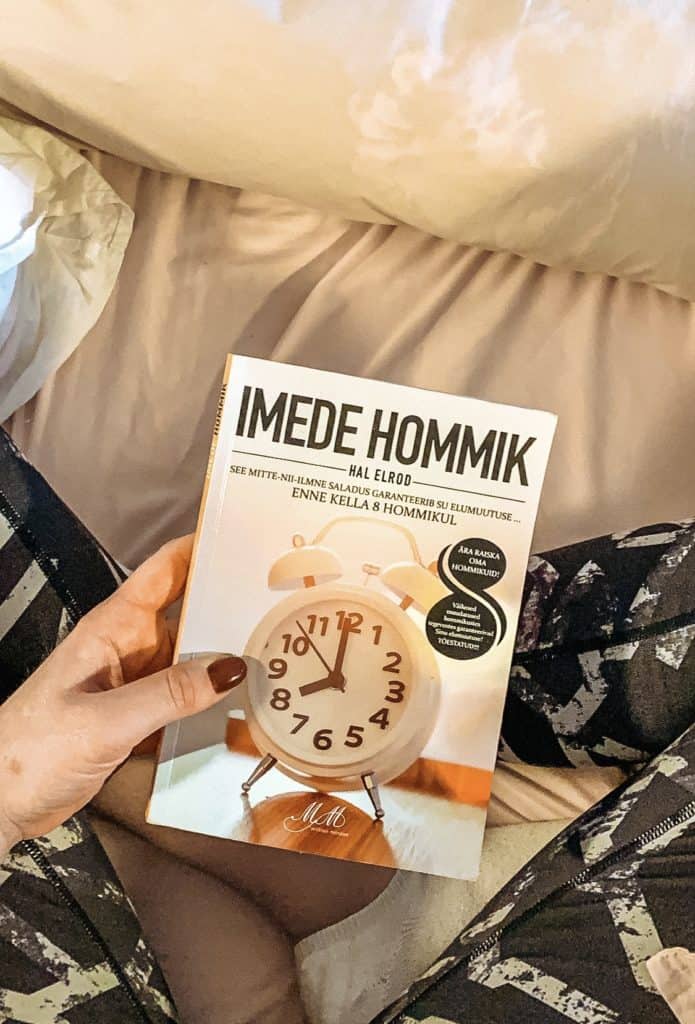
- Making notes and conclusions
When I am reading a physical book and it´s not borrowed, I generally use a highlighter to emphasize ideas that I want to especially remember. When I am listening to an audiobook I type ideas into Notes app. For me making summaries has helped a ton to overall be more excited about reading. Before it was common that even if I finished any book at the end of it I didn´t remember half of what I had read. Making notes actually helps to comprehend the most important takeaways and lessons from the book.
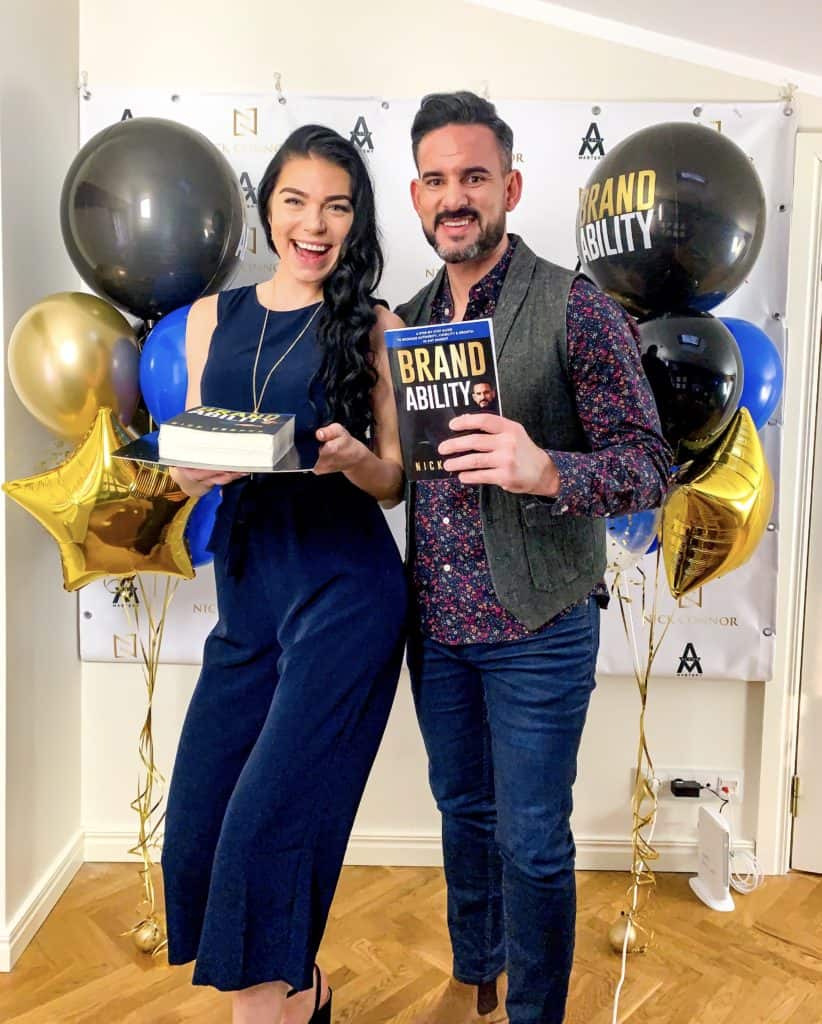
With these thoughts I present to you 2020 book reviews part one:
- "The Ride of a Lifetime" Robert Eiger

I´ve loved Disney characters since I was little. Never had I imagined though what does it mean to run a business that has created everything associated with these amazing creatures who are adored all over the world. Well, not only did I end up learning about the company responsible for a lot of my childhood favorites but also got an insight into a person´s life is the head of it. Robert Iger shares the leadership lessons of his 15 years serving as Disney´s CEO. Reading about his schedule, waking up at 4.15 EVERY morning, and scheduling his time to a minute shows his absolute commitment to building a great company.
Key take-aways/ reminders:
- “True authority and true leadership come from knowing who you are and not pretending to be anything else.”
- “Innovate or die, and there's no innovation if you operate out of fear of the new or untested.”
- “If you approach and engage people with respect and empathy, the seemingly impossible can become real.”
- “Somehow that’s the trick of leadership, too, I think, to hold on to that awareness of yourself even as the world tells you how powerful and important you are. The moment you start to believe it all too much, the moment you look yourself in the mirror and see a title emblazoned on your forehead, you’ve lost your way. That may be the hardest but also the most necessary lesson to keep in mind, that wherever you are along the path, you’re the same person you’ve always been.”
2. "Dare to Lead" Brene Brown

Last year I read Brene Brown´s "The Gifts of Imperfection" and had a lot of great reminders, so I was really excited to dig into this one. As my first book was also about leadership it was interesting to continue on the topic and bring parallels with the two thought-leaders. Leadership incorporates often dealing with a set of "soft topics" that can be seen as fluffy. I appreciate how Brene Brown backs up the value and importance of those with thorough research and stories. Although most of the examples are from professional settings I believe a lot of the principles can be implemented in leading also a family.
Key take-aways/ reminders:
- “We fail the minute we let someone else define success for us.”
- "There is no strength without vulnerability. To be the person who we long to be - we must take off the armor, put down the weapons, show up, and let ourselves be seen.”
- “I define a leader as anyone who takes responsibility for finding the potential in people and processes, and who has the courage to develop that potential.”
- “We asked a thousand leaders to list marble-earning behaviors—what do your team members do that earns your trust? The most common answer: asking for help. When it comes to people who do not habitually ask for help, the leaders we polled explained that they would not delegate important work to them because the leaders did not trust that they would raise their hands and ask for help. Mind. Blown.”
- "People are people. Strip away the titles"
3. "Atomic Habits" James Clear
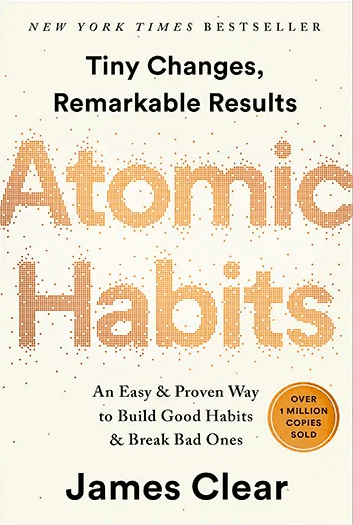
I am a firm believer that the level of our individual habits makes up the quality of our life. I have studied habits a bunch and professionally help people develop and sustain habits that serve them long-term, still had so many moments where I paused this audiobook and let an idea soak in. This book broke the nature of habits and the steps to changing them down so, so well. Applause- worthy!
Key take-aways/ reminders:
- “You do not rise to the level of your goals. You fall to the level of your systems.”
- “You should be far more concerned with your current trajectory than with your current results.”
- “The purpose of setting goals is to win the game. The purpose of building systems is to continue playing the game. True long-term thinking is goal-less thinking. It’s not about any single accomplishment. It is about the cycle of endless refinement and continuous improvement. Ultimately, it is your commitment to the process that will determine your progress.”
- “When you fall in love with the process rather than the product, you don’t have to wait to give yourself permission to be happy. You can be satisfied anytime your system is running.”
- “You don’t have to be the victim of your environment. You can also be the architect of it.”
- "Mastery takes patience. One atomic habit a day won´t make a difference, but the accumulation will!"
- "If your beliefs don´t change, your habits won´t too. Your identity has to be adjusted first."
4. "The One Things" Gary Keller

This book discusses the value of simplifying workload by focusing on the one most important task in any given project. I felt the book served the same idea over and over, so it got a bit repetitive, but at the same time honed in the main thought really strongly. The author Gary Keller built himself up from a real- estate agent to being the co-founder of one of the world´s largest real-estate franchises, so clearly- he is the epitome of implementing "The One Thing" concept.
Key take-aways/ reminders:
- "The world doesn´t know your purpose or priority and isn´t responsible for them. You are! So it´s your job to protect your time blocks from all those who don´t know what matters most to you and from yourself when you forget."
- "The secret of getting ahead is getting started"
- "Work is a rubber ball. It´ll always bounce back. Family, health, friends, integrity are glass balls. You don´t want to drop those."
- "Multitasking is merely an opportunity to screw up more than one thing at a time."
- "Appointments with yourself are as important as with others."
- "Activity is often unrelated to productivity and busyness rarely takes care of business. High achievers work with a sense of priority."
- “It is not that we have too little time to do all the things we need to do, it is that we feel the need to do too many things in the time we have.”
5. "Mamba Mentality" Kobe Bryant
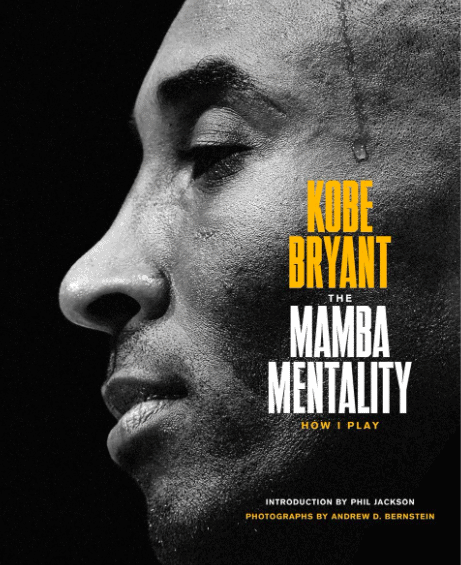
This January the world was shocked by hearing the news about Kobe Bryant´s tragic helicopter accident. One of the greatest basketball players of all time, a husband, a dad to 4 beautiful girls, a leader, Emmy, and Oscar winner- the world definitely lost an outstanding person. Kobe´s passing made me think so much about how people use their time on this planet to make an impact. People die every minute and we all have exactly the same amount of minutes every day, but not everyone´s lives are celebrated the way his was. Reading this book showed why. His focus, commitment, work ethic and drive to his craft, to his family and passions were absolutely astonishing.
Key take-aways/ reminders:
- “The mindset isn’t about seeking a result—it’s more about the process of getting to that result. It’s about the journey and the approach. It’s a way of life."
- “If you really want to be great at something you have to truly care about it. If you want to be great in a particular area, you have to obsess over it.”
- "I never thought about my daily preparation. It wasn’t a matter of whether it was an option or not. It was if I want to play, this is what I have to do, so I’d just show up and do it."
- "It’s weird, actually—fundamentals aren’t really fundamental anymore. A lot of players don’t understand the game or the importance of footwork, spacing. It’s to the point where if you know the basics, you have an advantage on the majority of players."
- "Coaches are teachers. Some coaches—lesser coaches—try telling you things. Good coaches, however, teach you how to think and arm you with the fundamental tools necessary to execute properly. …Good coaches tell you where the fish are, great coaches teach you how to find them."
6. "What I Know for Sure" Oprah Winfrey
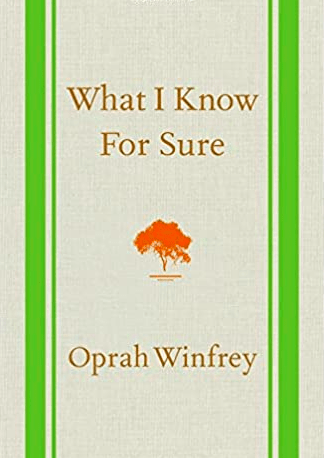
When I once asked for some book recommendations, this was one that many mentioned. Oprah´s name is probably familiar to most people, but starting this book I didn´t know too much about her story or life. Learning about her childhood, giving birth at 14 years old, losing a baby, dealing with physical abuse, self-value struggles and so much more it is so inspiring to me how she has just kept on going, holding her head up high. Today she has built a portfolio of businesses, through her famous talk-show impacted millions of lives and become one of the most influential and financially successful women in the world. In this book, she shares her main principles- joy, resilience, connection, gratitude, possibility, awe, clarity, and power.
Key take-aways/ reminders:
- "If the only prayer you will ever say is "thank you" it will be enough."
- “What I know for sure is that pleasure is energy reciprocated: What you put out comes back. Your base level of pleasure is determined by how you view your whole life.”
- “There is one irrefutable law of the universe: We are each responsible for our own life.”
- "When you have nothing to be ashamed of when you know who you are and what you stand for, you stand in wisdom.”
- “You are the single biggest influence in your life.”
7. "Build an Empire" Elena Cardone
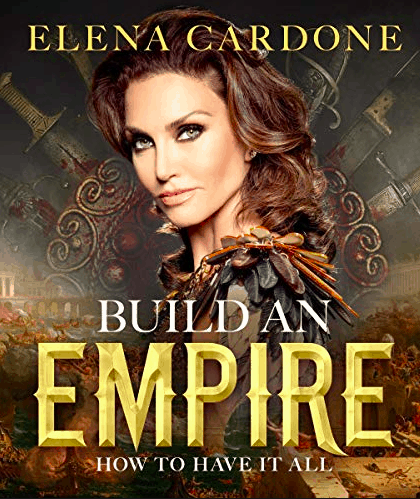
Cardones have achieved a lot in their life and more than what they have accomplished I admire how they have done it. While building their empire they have set in place clear rules and roles and are not willing to sacrifice any area of their life that matters to them. Family, health, business, physical appearance, relationships- everything is taken care of with intention and precision. Elena is a gorgeous, smart, fearless, persistent, classy, hard-working power-house type of woman and she is someone I have mad respect for. Reading about her upbringing in New Orleans and wild lifestyle with drugs and alcohol, guns, it proves, even more, how determined she is. I love how she draws parallels with a kingdom setup. "Even in Chess, the Queen has more power than the King...The Queen protects its King to maintain the survival of the kingdom." She definitely plays her role mighty well!
Key take-aways/ reminders:
- "Empires are destroyed from the inside."
- "I vet everyone in our Royal Court. All who come in contact with me and Frant. The Queens make the hard decisions, no matter what they say, for the good of all."
- "If everyone on this planet lived up to their full potential and succeeded only imagine the contribution to the planet. It would be a renaissance of earth."
- "Normal is dangerous. "
- "If you are not building an empire, you are destroying one."
8. "Billion Dollar Whale" Tom Wright, Bradley Hope
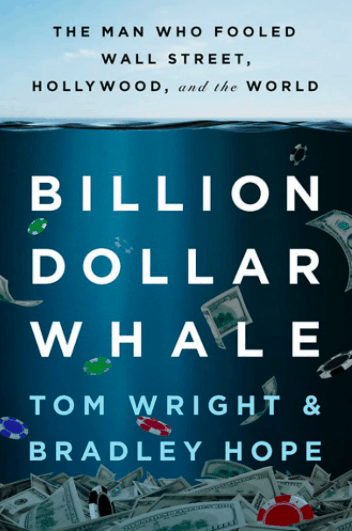
Last year I read "Bad Blood" which similarly to this book shares a fraud on a large, international scale. Yet again it´s hard for me to grasp how in this day and age a crime this huge, involving swingling over 5 billion dollars globally and getting away without a legal process is even imaginable. Even crazier- during that time maintaining a lavish, luxury lifestyle and innocence. Some of these numbers and actions are just so insane. For example between October 2009 and June 2010—a period of only eight months the main character Low and his entourage spent $85 million on alcohol, gambling in Vegas, private jets, renting superyachts, and to pay Playmates and Hollywood celebrities to hang out with them. Since it is a true story with well- known names (Leonardo DiCaprio, Paris Hilton, Miranda Kerr) making an entrance, it makes it a very thrilling book to read.
Key take-aways/ reminders:
- “His was a scheme for the twenty-first century, a truly global endeavor that produced nothing—a shift of cash from a poorly controlled state fund in the developing world, diverting it into the opaque corners of an under-policed financial system that’s all but broken.”
- “Mortality and aging cast a shadow across everyone’s life, but the uberwealthy have a better chance of cheating death.”
- “This is a fucking scam—anybody who does this has stolen money,” Belfort told Anne, as the music thumped. “You wouldn’t spend money you worked for like that.”
9. "The Wizenard Series" Kobe Bryant, Wesley King

During the news of Kobe´s death, I read quite a bit about his life and games. Most know about his basketball achievements, but when he finished his career as a professional athlete and people asked- "What are you going to do now?" he said- "I am going to be a story-teller." That not sounding like a "real" thing to do, most probably shoved it off thinking that is a privileged thing to say for someone who wouldn´t have to work a day in his life anymore. Kobe proved them wrong with creating the "Wizenard Series" which hit the New York Times bestseller. It shares a portrait of five young basketball players- their fears, challenges, limits; one enlightening coach, and the transformative power of the game.
Key take-aways/ reminders:
- "Everyone has a choice every moment of the day. Look, or look away."
- "Give your fear a face or you will see it everywhere."
- "If you don´t like being alone you must learn to like yourself."
- "If you bring too much with you, how are you going to help others with your bags?"
- "There is only one critic that matters."
- "No one wins alone. Those who forget this do not win."
- "Anger is your mind telling you to step away and breath."
- "What you see in the mirror comes from the mind, not the body."
10. "Miracle Morning" Hal Elrod

I told myself for a long time- "I am just not a morning person." Comes out it is not necessarily a code in our genes, but rather a decision we´ve made and then the supporting case we have built around it for ourselves. Over the years I have worked hard to hone in my morning routine and come to believe I can be a morning person if I want to. Since this is a topic I´ve devoted quite a bit of effort previously, this book to me mainly gave tweaks to make it even more impactful. For someone who knows their mornings are wonky and has wanted to change that, this is an amazing book. Hal Elrod shared his magnificent healing story from a car accident and the steps of a miracle morning- silence/meditation, journaling, affirmations/prayer, visualization, reading, exercising.
Key take-aways/ reminders:
- “Give up being perfect for being authentic.”
- “You are where you are because of who you were, but where you go depends entirely on who you choose to be.”
- “Why is it that when a baby is born we often refer to him or her as ‘the miracle of life’ but then we go on to accept mediocrity for our own lives. When did we lose sight of the Miracle that WE are living?”
- “Those who only do what they feel like… don’t do much. To be successful at anything you must take action even when you don’t feel like it, knowing that the action itself will produce the motivation you need to follow through.”
- “You are always exactly where you are supposed to be, experiencing what you need to experience, to learn what you must learn, in order to become the person you need to be to create the life you truly want. Always.”
11. "Why We Sleep" Matthew Walker
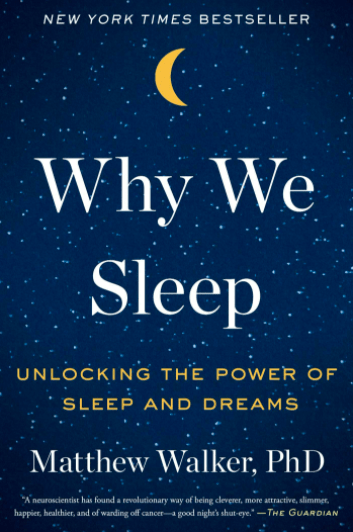
When I worked with Southwestern Advantage, selling books for 5 years door-to-door we used to always say- "Sleep makes champions." That was a very specific part of our schedule and was supposed to be protected fiercely. I never fully bought into the idea, because it seemed to me, that the hustle and grind mentality didn´t appreciate nor leave too much time for something like sleep. This book absolutely debunks that myth and shows how we are linguistically, mentally, physically, socially, nutritionally, emotionally, behaviourally, organizationally, economically, cognitively.... basically in EVERY way dependent on the quality of our sleep.
Key take-aways/ reminders:
- "Inadequate sleep is the foundation for a lot of diseases. A good sleep schedule can often do what medicine can´t."
- "Humans are the only species who deprive themselves of sleep without any gain."
- "Tiredness causes more deadly car accidents than drugs of alcohol."
- "Sleep is the single most important thing we can do to reset our brain and body."
- "Coffee and energy drinks and great, but there is absolutely nothing that can sustainably substitute sleep."
12. "10X Rule" Grant Cardone

Since I fell in love with Elena Cardone and I´ve been following them for a while it made sense to dig into one of Grant´s books too. Sometimes I like holding a physical book much more than an audio one, but this definitely worked the opposite way. Since Grant read it himself his commitment, enthusiasm, confidence, and unshakable belief in his principles pierced through every word of his and struck a stronger chord. While Elena to me serves her ideas in a bit softer, yet confident way, Grant is very much cut to the chase, raw, straight, and hard-core with his points. It may seem offensive at times, but I think is very necessary and helpful in order to catch one´s ear and actually reinforce action.
Key take-aways/ reminders:
- "Good things don´t happen to victims."
- "Success is not only about achieving your targets, but also maintaining them. "
- "Don´t look for balance, look for abundance."
- "Customer acquisition focus should always surpass customer satisfaction focus."
- “Weak and overwhelmed individuals respond to others' success by attacking it.”
- “You know, you don't need to grow old to die. I was dying at the age of 20 as a result of no direction and no purpose.”
13. "Sex. Power. Money" Sara Pascoe

I was a bit skeptical starting a book written by a female stand-up comedian, especially on those topics on the cover, but at the same time, it was a too intriguing title to let it pass by. The book is witty and comical, but also well-researched. She presents scientific studies while cautioning not to make too many generalizations of the findings. Her feminist voice shines throughout, and her arguments are sensible and convincing, especially in recognizing the contradictions on the subject. The piece addresses matters like porn, prostitution, gender equality, our evolutionary biology, raising boys and girls, and what roles sex, power and money play in society and how they intersect/influence each other.
Key take-aways/ reminders:
- "We see things not as they are, but as we are."
- Dopamine is creating our urges, needs, wants- our desire- then oxytocin is sating it. This is why being with the person you love is so satisfying while unrequited love is pure agitation. Our dopamine pathway is a powerful motivator to getting what we want, but when we can´t get it, if we are fixated on something or someone impossible, then it can leave us anguished."
- “Birds are monogamous because their young require the input of two parents. This isn’t a romance, it’s an evolutionary necessity.”
14. "Teekond iseenedani" Liis Velsker (Estonian´s authors´ book reviews I will write in Estonian)
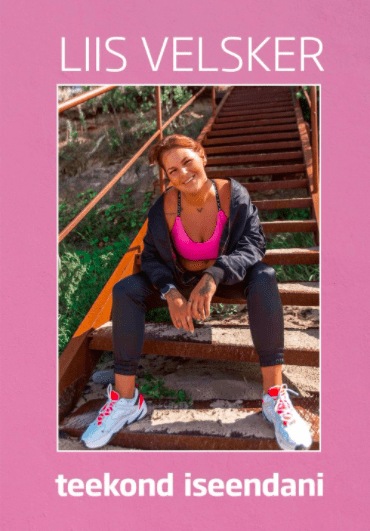
Olen Liisi juba ammu sotsiaalmeedia vahendusel jälginud. Eelmine aasta kui mul avanes võimalus vinge Katrin Hinrikus-Karuga ühte Täitsa Pekkis saadet läbi viia, tuli Liisi nimi mulle interviueeritava otsinguil kohe esimesena mõtteisse. Olen alati hinnanud tema ausust ja läbipaistvust jagades oma teekonda koos kõikide selle emotsioonide ja üles-alla võngetega. Liis kirjutab enda raamatus oma teekonnas kehakaalu ja tervisega seoses lapsepõlvest tänaseni. Liis pajatab enda tunnetest diabeedi diagnoosiga trullakaks plikaks olemiseks ning edasi möllumeelseks, pidutsevaks neiuks kujunemisest. Ta jagab ideid oma nüüdsest terviseentusiasti elust, eneseväärtusest ja printsiipidest, mis teda sellest kõigest läbi minnes on aidanud.
Peamised tähelepanekud / meeldetuletused:
- "Proovi ja sa ei kahetse- tänulikkus, mediteerimine, sport, tervislik toit, raamatud."
- "Lõpeta hinnagute andmine! Mul on kahju sellest kui ihti me teisi hukka mõistame. Kui palju on inimestel julgust öelda halba selle asemel, et öelda head. Või üldse- kui palju on kõigil teiste kohta midagi öelda. Kui tahad öedla halba, siis ole parem vait. Kui tahad öelda head, siis ütle see välja."
- "Lepi iseendaga! Olen terve elu püüdnud end muuta, aga kas tead, kui väsitav see on? Muidugi tead, sest me kõik oleme püüdnud seda teha."
- "Veeda aega iseendaga! Ma olen seda tuhat korda öeldnud, aga kordan veel! Enesearmastus ei tule lihtsalt. See pole selline "Põmm! Ja nüüd armastan ennast!" Õpi enda tundma, veeda aega endaga, mõtiskle ja esita küsimusi. "
15. "What Noone Tells You- a guide to your emotions through pregnancy to motherhood" Alexandra Sacks, Catherin Birndorf
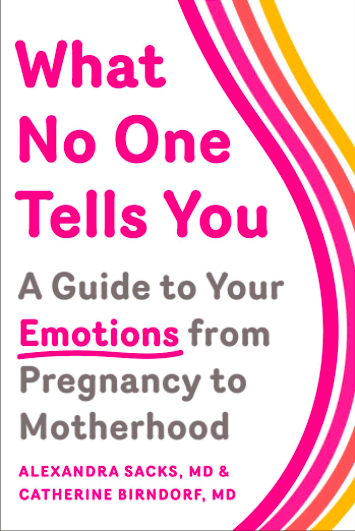
Here we go with the baby books...:) I started listening to this book being about 18 weeks pregnant and that was the time I was the most emotional. It was a pretty ordinary sight- me on my morning walk, wiping tears from my eyes. It wasn´t necessarily that this very book was so moving, it was just that was pretty much the first time in the pregnancy that I fully allowed myself to believe this is really happening. Since it was the first book of its kind for me and I didn´t have any comparison on the topic yet, I really appreciate how it focused on not only the "how-to" part of pregnancy and motherhood but more of all the emotions flowing through the women´s body and mind during that time.
Key take-aways/ reminders:
- "On your child´s birthdays don´t just celebrate the baby, celebrate yourself too. You are doing one hell of a job!"
- "Don´t project your own habits and issues on the baby."
- "Trust! The baby will step-by-step teach you how to take care of him/ her."
- "There is no such thing as a perfect mom. In parenthood being good enough is really good enough. It´s not the enemy of great."
- "Throughout all of the pregnancy and postpartum emotions talk to your partner like you would with a stranger- be polite, ask directly, and don´t assume they are a mind-reader."
16. "Brandability" Nick Connor

Yeap- you do see correct! I share the same last name with the author of this book. In fact, he was the one who gave me that name. As crazy as it may seem- I am reviewing my husband´s book:) During the time Nick was writing this book I didn´t get too involved in the process. I heard bits and pieces and obviously saw him in the creation, but I never read the manuscript before it went to print. So I was reading it the same way I would read any other book (just with a lot of familiar names and situations:D) Anyway... I was amazed the entire time I read it. My best friend and the love of my life put this together??? Nick has always captivated me with his ability to write in an engaging, simple yet impactful way, but this truly exceeded my expectations. The fact that he self-published it adds another skillset into the mix.
Although we discuss our business ideas all the time, some of these things were even new to me. So doing the exercises along I gained some clarity on my vision and action steps. The book is divided into two bigger parts- first the mental side of building your business and second the technical one. Plus important phases of Nick´s own journey- losing his father, deepening his faith, being celibate for two years, building his own business, and more. Surely a great book for salespeople, leaders, entrepreneurs.
Key take-aways/ reminders:
- "How much is really enough? One person can only spend so much money, and you can only be so free. But will you ever feel that you´ve done enough when it comes to making a difference?"
- "I´ve got good news, bad news, and great news. The good news is that you get to choose where you end up. What´s the bad news? Unfortunately, your mind is going to try to convince you that it´s impossible for you to end up in your chosen destination, but the great news is that your future has nothing to do with your past."
- "New level, new devil."
17. "Elon Musk" Ashlee Vance

Reading Elon Musk´s book I was reminded again, that there is no successful person with an easy past or a simple path that they´ve walked. To me, it´s always interesting to learn about the upbringing of people like him to understand what molded them to be the person they are. Elon´s rough childhood in South-Africa, difficulties at home, bullying and beatings at school made him resilient and tough. The harder it got, the better he got. No one would probably ever wish for a childhood like that in order to become what he has become, but knowing that was his beginning, makes his journey even more admirable. Looking at what he has built, the insanely vast vision he has for what he is still going to create and the way he has impacted multiple industries is mind-blowing. Sometimes the saying- "One person can change the world" may sound too unrealistic or even fluffy, dreamy. In some cases the saying is true!
Key take-aways/ reminders:
- “To the extent that the world still doubts Elon, I think it’s a reflection on the insanity of the world and not on the supposed insanity of Elon.”
- “What’s fascinating is that Musk remains willing to lose it all.”
- “One of the really tough things is figuring out what questions to ask. Once you figure out the question, then the answer is relatively easy. I came to the conclusion that really we should aspire to increase the scope and scale of human consciousness in order to better understand what questions to ask.”
- “If the rules are such that you can’t make progress, then you have to fight the rules.”
18. "Think and Grow Rich" Napoleon Hill

This book was published in 1937 and although it has timeless information and forever relevant wisdom, I found it a little slow. If that would have been one of the firsts of this type of literature for me, the situation would have probably been different. Many good reminders, but not so much "Oh, that´s a good one" new moments for me. Nevertheless, this piece was a pathmaker for a lot of authors and books, and I admire that. Napoleon Hill´s son´s story that he shares throughout the book is remarkable and proves again, that nothing in this world is impossible. The word itself says- "I´m possible."
Key take-aways/ reminders:
- "It´s not what you know, it´s what you use."
- "Nothing can take the place of persistence"
- "Just plain knowledge is not power, it´s potential power. It becomes power only when, and if, it is organized into definite plans of action, and directed to a definite end.”
- “Happiness is found in doing, not merely possessing.”
- “Remember that your real wealth can be measured not by what you have, but by what you are.”
- “A quitter never wins—and— a winner never quits.”
- “The day of the “go-getter” has passed. He has been supplanted by the “go-giver.”
- “Love is, without question, life’s greatest experience.”
- “I am the Master of my Fate, I am the Captain of my Soul.”
19. "Gentleman in Moscow" Amor Towels

Starting this year my goal was to expand the type of literature I consume. I very rarely read or listen to novels. I´ve told myself a long time that I am not just that type of reader. If it´s made up and I can´t google more about it later if I wanted to, it´s not my cup of tea. What a silly story to tell myself! This book popped up on multiple lists and people´s recommendations that I follow and I had to see what the fuss is about. This historical fiction taking place in the Stalin era Moscow has a bit of everything- romance, politics, parenthood, espionage, and surprisingly it kept me engaged. Some descriptions were too long for my non-fictional, let´s get to the point brain, but overall I really enjoyed this one! Also, Amor Towel´s writing is so beautiful that it was a pleasure to listen to so masterful style.
Key take-aways/ reminders:
- “If patience wasn’t so easily tested, then it would hardly be a virtue. "
- “For what matters in life is not whether we receive a round of applause; what matters is whether we have the courage to venture forth despite the uncertainty of acclaim.”
- “Man must master his circumstances or otherwise be mastered by them.”
- “Looking back, it seems to me that there are people who play an essential role in every turn. And I don’t just mean the Napoleons who influence the course of history; I mean men and women who routinely appear at critical junctures in the progress of art, or commerce, or the evolution of ideas—as if Life itself has summoned them once again to help fulfill its purpose."
20. "Naiseks Olemise Kunst" Katrin Saali Saul
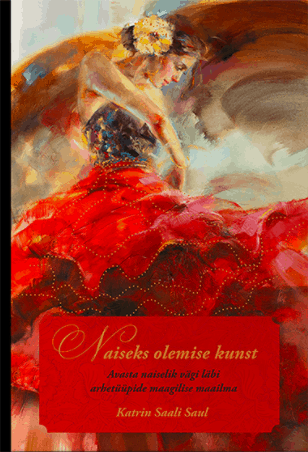
Ma ostsin selle raamatu kuskil 3 aastat tagasi mitmete sõbrannade soovitusel. Nii ta kannatlikult selle aja riiulis istus ja oma aega ootas. Alustasin küll tema lugemisega vähemalt kaks korda, aga jällegi leidsin, et kuidagi igav ja aeglane ja no mitte ei kõneta. Nüüd vaatas ta mulle sealt teiste raamatute vahelt uuesti ja eriti ahvatlevalt otsa ning ma olen nii tänulik, et selle lõplikult seekord ette võtsin. Raamat räägib neljast nais arheotüübist- tütarlaps, armastaja, kuninganna ning perenanine ja nende äärmuslikest versioonidest. Kirjutasin usinalt kaasa vastuseid küsimustele iga peatüki juures ning märkasin enda kohta asju, millele varem nii teadlikult polnud mõelnud. Rasedus on üldiselt kogu naiseks olemise kontseptsiooni minu jaoks muutnud ning ehk ka seepärast oli sisu nii mõjuvõimas.
Peamised tähelepanekud / meeldetuletused:
- "Terve naine = terve perekond"
- "Me vajame Tüdrukut endas, et elus mitte „ära kuivada“. Temas on elurõõmu, uudishimu ja imetlust. Tüdruku kõige tähtsam oskus on usaldada ning olla kohal – siin ja praegu. Ta hoiab suhtes lootust, näitab välja tundeid, on spontaanne, õnnelik, loov ja ta unistab."
- "Et südamel oleks põhjust edasi tuksuda, vajame me Armastajat, kes annab meile hinge- ja kehasoojust. Temas on tabamatu naiselikkus. Armastaja oskab olla salapärane, kirglik, häbitu, oskab nautida ning ahvatleda. Armastaja pakub seksuaalset naudingut, inspireerib meest tema muusana ja kiirgab rahulolu."
- "Perenaine loob meile kodu – koha, kuhu tulla. Tema oskustest sõltub meie sisemine puhtus, rahu ja tasakaal. Ta tunneb suhete seaduspärasusi, säilitab rahu, on teadlik oma väeallikatest, mõistab vaimseid põhitõdesid."
- "Et saaksime teha elus tarku valikuid, on meil vaja Kuningannat. Tema on see, kes oskab näha sihti, milleni jõuda ning kes oskab anda piisavalt hapnikku hingele ja ajule, et mitte ära minestada elukeerdkäikude ees ja sees. Ta oskab ennast väärtustada, ennast väljendada, oskab vaikida ja öelda ei. Ta teab oma missiooni elus, on kontaktis oma väega ja tunneb viisakusreegleid."
Finishing this I want to emphasize again, that reading does not come easier to some people than others. For me, it definitely hasn´t. It´s a choice, like any other, that we make, commit, and execute. So even if you were like me in July 2018 with 0 books read during that year thus far, then you can still turn the switch.

I´ll leave you with one thought from the master, Dr. Seuss himself- "The more that you read, the more things you will know. The more that you learn, the more places you´ll go."
Love,
Liisa.
Making to most out of working remotely
March 17, 2020
The current events happening in the world with the pandemic have left very few unaffected. These are the times that push us to be creative, that expand our comfort zone and find ways to make things work.
One of the things a lot of people are facing right now is moving into a home office and working remotely. Although it might seem like a dream come true for some who have always longed to not go to an office every day, it probably doesn't take too long to realize that working remotely has its own set of challenges. Have you found yourself thinking- "Dang, this is far harder than I expected it to be."
I have never worked from a shared office, so I've really had to figure out what are the things that bring results with remote work and what are the absolute nonnegotiables. I share these with the utmost hope to help someone make this adjusting-curve a bit smoother. So here are a few ideas for you to be productive with working from home and giving YOUR best at the moment.

- Schedule
Obviously wherever you work from your schedule is your lifeline, but especially working from home your plan for the week and for the day are critical. Of course, it has to be put together based on your current situation, but entering the day and week without any plan will definitely not set you up for success. If you don't know how your ideal week would look like working from your home office, then it will be very difficult for you to start living it.
- Lunch, food, breaks
Although your fridge is probably much closer to you than it used to be in the office (+ probably filled with all the goodies you've stacked up), that is not the reason to invade it regularly. Schedule when you have your lunch break ( and/or some snack times if that's what you do in the office too) and stick to it. Definitely do plan time for lunch though, because otherwise it will become a reactive thing (that you actually know can be scheduled proactively ahead of time) and it will already change your schedule.

- House chores
Trust me- doing laundry or cleaning your closet or whatever home chore you've been putting off for some time will become distractors. Especially when you know you should be professionally doing something that is not always the easiest thing to do (sales calls, client service contacts or whatever is a KPI for you). Dusting, cooking or organizing something, that in your mind might be justified by "I'll just quickly get this done" will add up big time. If you wouldn't start vacuuming or washing dishes randomly in the middle of your office work-day, then this should stay the same when working remotely.
- Clear working hours
When working from home it will be very easy to confuse "work time" and "home time. " If you don't intentionally draw a line yourself between those two, you'll soon feel like you are working all the time, but won't still get everything done. Why? Because you are not focused on the task in hand. Decide when you start and when you finish and give yourself emotional permission to not break those times. Even if I'd work from a shared office I wouldn't be refreshing my email constantly in the evening and thus driving myself crazy, so I am definitely not doing it working remotely too. You shouldn't too! (if you want to keep your sanity)
2. Family members and boundaries
- Spouse
This is the time where you and your spouse both might be working from home which adds another layer of distraction. What we have done with Nick is that we share our schedules with each other so we know when we are doing what. If we know that we want to give each other our full focus, then we also know not to engage during a time the other has to be focused on something else. If you want to eat lunch together, awesome- agree on that first hand, but help the other one stick to their plan too. The key here... communicate ahead of time!

- Kids
We don't have kids yet, so I might not be able to fully relate to the situation of people who have. I also understand that the current system of school being online adds a big obstacle to a lot of parent's routines, so I don't want to be mindful of not knowing the full story here. As a principle, there isn't much more you can do other than figure out the best schedule for your current situation.
- Workspace
Designate a place that will become your workspace. If you start doing your email and projects, calls from your coach where you usually lounge and watch TV in the evening hours, then it is going to be very hard for your brain to focus 100% on a new given task. If you have the luxury of having a separate room, that is wonderful. If you don't, just choose your corner or create the best option so that entering that area you signal your brain to be in a professional mode. The same way with leaving it. When you finish, close your computer and put away papers- it's time for them to rest too.

3. Showing up
- Clothing
At the beginning you might be attempted to maximize your sleep, knowing you will be saving time with commuting and choosing an outfit for an office workday and thus sleeping longer than you would otherwise. This is a very important thing to tackle right away. Your mornings are crucial to the success of your day.
It would be easy to jump right from the bed behind your computer and start answering your emails, but if you wouldn't show up in the office in pajamas or sweatpants, then you shouldn't do this at home too.
Now, do I wear full make-up or put too much thought into if my earings or bag match with the current day's outfit? Definitely not. Will I look presentable though every day? Absolutely (have to ask my clients...:D I'd like to think so!). When you look good, you'll feel good. You don't have to wear a suit as some of you might otherwise, but at least make a difference between your work hour clothes and your home clothes.

- Morning routine
I briefly mentioned this already above and I truly believe in the power of morning routines overall, so it's important enough to expand on it a bit more. Figure out a clear morning routine for you and stick to it wherever you'd work from. My morning always includes gratitude, visualization, affirmations, a good cup of coffee, moving/working out, healthy breakfast. Those activities don't have to take hours, sometimes 5-10 minutes of each will be enough, but there is a reason for all of those steps. My mornings never include snooze- button. So figure out yours and protect it with all you got!


4. Accountability
- Discipline
You will quickly understand that working remotely there won't be so many eyes on you as usual. That often correlates to less pressure, but unfortunately, often to more slacking too. No one is watching what you do in an unshared office, so holding yourself accountable becomes even more important. I, for example, send my schedule to my team- leader every Sunday. Not because I need micromanagement from him, but I know that when I do that my week will be more productive. In Southwestern Consulting we also track all of our metrics and view the ratios to be aware and honest first and foremost with ourselves.
- Fun
One thing you might soon start missing is the quick chats or little jokes with the colleagues that are more likely to happen in a shared office. Although there might be fewer human distractions working from home, after weeks it can become a bit boring. So some things we do with our team who all work remotely are video calls and dialing together for prospecting, leaving video messages, etc. If now you and your significant other both work from home, leave each other some fun post-it notes to brighten up their day and make them feel not so isolated.

As I write these I have a heureka moment myself of how most of these things start with our plan. In Southwestern Consulting we always say that if we fail to plan then we plan to fail.
I'll share here just a screenshot of my this week's schedule.

Now don't get caught up in the specific activities in there (your ideal week is YOURS), but focus on the principle. I do know when I work out. I do know when I am 100% focused on my calls and I do know when I spend time with my husband.
Bonus idea (not only relevant with remote office)- I plan our dinners ahead of time, not to think every evening- "Well.. what are we going to eat today." The less we can get thinking out of the formula, the more we are able to act efficiently.
Now clearly not all weeks are the same. I also don't have face-to-face meetings, workshops or new calls and I do have more coaching calls than usual this week, but that's okay. That is this week. On Sunday I plan my next week and whatever will make the most sense then, will be in there. Do things change, some activities move and have to be figured out on the go. Oh, absolutely! (especially now). But will it be easier to do it when you have a framework? For sure!
So again- don't get stuck on what I have in there, just think through YOUR plan. You don't need to compare it with anyone nor compete, that's not the goal. As I have emphasized probably 10 times here- The goal is to give YOUR best... and that will always be enough!
To sum up...you might have found some of these points very obvious and given props to yourself already for having strong habits with them. You might also have found some points that you have known you should be doing (whether you work from home or not), but you are not just putting them into practice persistently. And some of these points might be totally new ideas for you.
Well- whatever category you fell into- choose at least one for tomorrow and ACTUALLY do it. You don't have to figure it all out over-night but focus on the progress!

If you want to discuss your situation or how we might be able to help you in Southwestern Consulting, then write to me.
Also, share what has worked for you working remotely with me and others, so that we can all get better, focus more on the positive and get through this interesting time together as fast as possible.
Love.
Liisa.
2019 book reviews
February 12, 2020
One of the last blog posts that I wrote about doing hand-made Christmas presents started with me confessing that my grandma did most of my handicraft lesson tasks at school and that I have never been good with creating things with my hands.
I don't want to sound like a broken record, but being always transparent and honest... reading falls into the exact same category. It is something I have not enjoyed and avoided throughout most of my life.
When I was little I was too impatient to sit down and read children's books and when I grew older I told myself I am too busy to do it. Spark-notes and friends' summaries for compulsory reading did the work just fine.
I have always admired people who read a lot. To me they've seemed more well-rounded and intelligent. To myself I told though: "Well, good for them. I am just not a reader."
Pippi Longstocking was literally one of my favourite books until high school. Mainly because I hadn't read too much after that.
Why I share this is that you might relate to not being a fan of reading. Or even hating it, the way I did for a while. At the end of the day it is actually just a habit. Like any other- it is possible to change it. It is not easy... but doable when wanted.
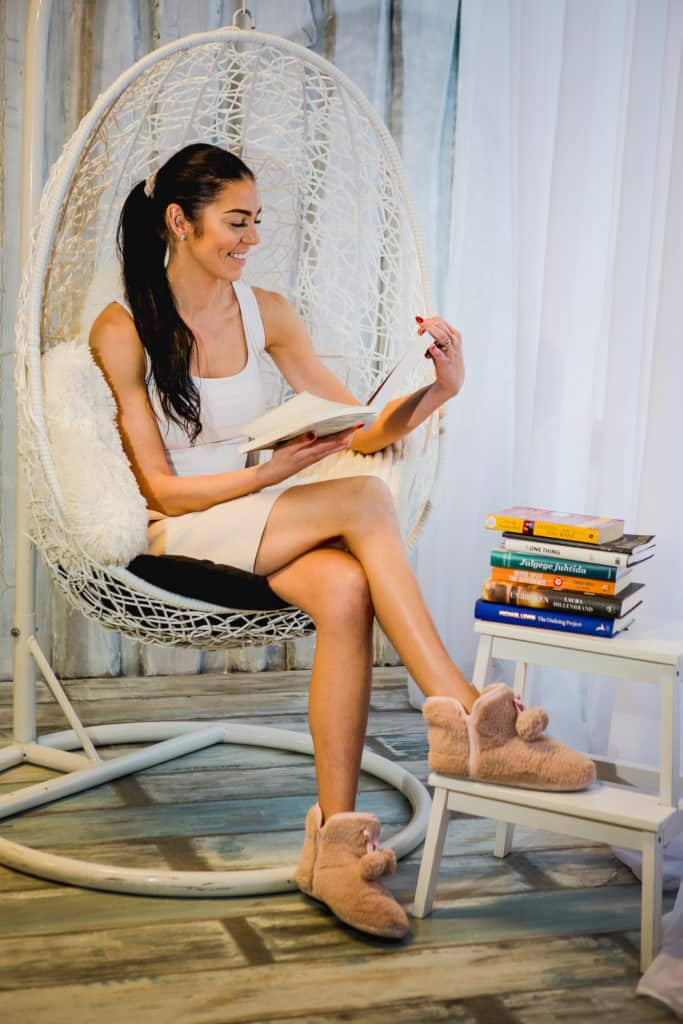
Reading-wise things changed when I went to college and started my professional career on the side. I was thrown into the personal development world and all of a sudden self-help books became an obsession. I started reading them because I wanted to emulate people who were successful in my eyes and knowing they did this, I figured it can't hurt.
Now I went to the other side.
I swallowed all the "10 steps to...." and "This is how you...." books and for that era of my life it was necessary, powerful and great. I remember thinking- "Wow, I've definitely missed out...the knowledge in these books is phenomenal!"
After some time though I over saturated my mind with that and couldn't pick up another book.
So I didn't read again. For years. Maybe one book here and there, but never formed a great habit with the activity nor identified myself as a reader.
Multiple years I gave a New Year's resolution that now I will read 1 book a month... but never did.
Last year I was fed up with it and promised to follow-through. Just adding true commitment to a goal, changes the whole perspective.

I also figured out what kind of books really get me excited. I am too realistic for non-fiction, but too fed up with technical self-help books. I started liking autobiographies and stories of real people sharing real-life things. Not as a guide, but through a personal experience.
Even with a busy schedule I decided that reading is something every evening I protect time for because I choose to and I want to. I also started listening to audiobooks, which I hadn't much before.
So without further due here are the small book-reviews of 2019:
1. “The Undoing Project” Michael Lewis

This book is about two Israeli psychologists Daniel Kahneman and Amos Tversky who shook the world with their research about the decision-making process and making judgements. They challenged the concepts of how we think about how we think. They were brilliant minds and became heroes, but at the same time were just friends and normal people going through their own struggles. A great, captivating book. Key take-aways/ reminders:
- "When people make decisions, they don't seek to maximise utility, they seek to minimise regret."
- "Knowledge is anything that increases your ability to predict the outcome."
- "When you are a pessimist and a bad thing happens, you live it twice. Once when you worry about it and the second time when it happens."
- "The human mind is bad at seeing things it does not expect to see, and a bit eager to see what is expected to see."
2. “The Saint, the Surfer, the CEO” Robin Sharma

This is an easy, yet profound book. Written in a well-flowing manner it talks about the main life lessons of three people. The story lines are easy enough to be relatable, but deep enough to be educational. Key take-aways/ reminders for me:
- Always ask yourself- "Did I live wisely? Did I love well? Did I serve greatly?"
- "Don't shy away from year fears, step right into them."
- "For every finger we point to others, we point three fingers to ourselves. Whatever we blame others for, the root is mostly inside us."
- "Turn your breakdowns to breakthroughs."
- "Don't let anyone walk through your heart / mind with their dirty feet!"
- "Your happiness is proportionate to how helpful you have been to the world."
- "For you to win, others don't have to lose."
3. “Becoming” Michelle Obama

I am not very involved with politics, but one thing I have always admired is Michelle and Barack Obama's marriage. Reading this book gives a new perspective to little things that otherwise are never thought of. Like going to movies or dinner without a thorough plan of how some streets have to be blocked and a group of bodyguards around. How every word you say, every clothing item you wear, how every moment of your life could be judged or commented. Michelle is definitely a huge role-model to me with the strong pursuit of improving causes important to her, protecting their relationship, supporting her husband throughout everything and being a strong, powerful woman. Key take-aways / reminders for me:
- "For me, becoming isn't about arriving somewhere or achieving a certain aim. I see it instead as forward motion, a means of evolving, a way to reach continuously toward a better self. The journey doesn't end."
- "Your story is what you have, what you will always have. It is something to own."
- "Failure is a felling long before it becomes an actual result."
4. “Shoedog” Phil Knight
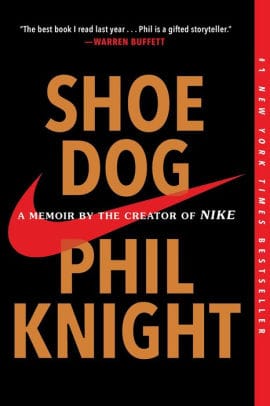
Nike has always been one of mine and my husband's favourite brands and it was absolutely fascinating to learn how this empire got started. Just like all big things- it all started with one person with a huge dream, a relentless work-ethic and belief to make it happen. A great inspiration for every entrepreneur! It is not only a description of Phil Knight's awesomeness and business success, but also a deep dive into his personal hardships and the ups and downs of running the business. Key take-aways / reminders:
- "You measure yourself by the people who measure themselves by you."
- "Let everyone else call your idea crazy... just keep on going. Don't stop. Don't even think about stopping until you get there, and don't give much thought to where "there" is. Whatever comes, just don't stop."
- "My hope was that when I failed, if I failed, I'd fail quickly, so I'd have enough time, enough years, to implement all the hard-won lessons. I wasn't much for setting goals, but this goal kept flashing through my mind every day, until it became my internal chant: fail fast."
5. “Born a Crime” Trevor Noah

I am used to seeing Trevor Noah on "The Daily Show" with sharp clothes, witty jokes and polished look. To read what he has been through to become who he is today is just crazy. He is an amazing example of overcoming adversity and succeeding despite all the adds against you. Key take-aways/ reminders:
- "We tell people to follow their dreams, but you can only dream of what you can imagine, and, depending on where you come from, your imagination can be quite limited. A kid cannot dream of being an astronaut if he doesn't know about space."
- "My mom did what school didn't. She taught me to think."
- "Comfort can be dangerous. Comfort provides a floor but also a ceiling."
6. “Open” Andre Agassi

It is still conflicting for me to think, that Andre Agassi, although one of the best at his sport, said he hated tennis. What a controversial thought to what everyone says- "If you just love what you do, you'll be good at it." Mr. Agassi is surely a fascinating character to read about. Key take-aways/ reminders:
- "There are many ways of getting strong, sometimes talking is the best way."
- "If you don't practice you don't deserve to win."
- "My father says that if I hit 2500 balls each day, I'll hit 17 500 balls each week and at the end of one year I'll have hit nearly one million balls. He believes in math. Numbers, he says, don't lie. A child who hits one million balls each year will be unbeatable. Control what you can control."
- "Some people are thermometers, some are thermostats. They whether register the temperature in the room or the change it."
7. “Never Split the Difference” Chris Voss

This book is based on the author's experience with hostage negotiation career in FBI. Not only are the stories about kidnappers and bank hostage situations thrilling to read, Chris Voss brings parallels of using the same techniques in business environments and different negotiations. My husband Nick shared with me that when he was buying my engagement ring he was using a few of the suggestions from this book when dealing with the jeweller. Key take-aways/ reminders:
- "It all starts with the universally applicable premise that people want to be understood and accepted. Listening is the cheapest, yet most effective concession we can make to get there. By listening intensely, a negotiator demonstrates empathy and shows a sincere desire to better understand what the other side is experiencing. When individuals feel listened to, they tend to listen to themselves more carefully and to openly evaluate and clarify their own thoughts and feelings.”
- “Mirroring is magic! By repeating back what people say, you trigger this mirroring instinct and your counterpart will inevitably elaborate on what was just said and sustain the process of connecting.”
- “A good negotiator prepares, going in, to be ready for possible surprises; a great negotiator aims to use her skills to reveal the surprises she is certain to find. Don’t commit to assumptions; instead, view them as hypotheses and use the negotiation to test them rigorously. People who view negotiation as a battle of arguments become overwhelmed by the voices in their head. Negotiation is not an act of battle; it’s a process of discovery. The goal is to uncover as much information as possible.
- “Yes” is nothing without “How.” Asking “How,” knowing “How,” and defining “How” are all part of the effective negotiator’s arsenal. He would be unarmed without them. ■ Ask calibrated “How” questions, and ask them again and again. Asking “How” keeps your counterparts engaged but off balance. Answering the questions will give them the illusion of control. It will also lead them to contemplate your problems when making their demands. ■ Use “How” questions to shape the negotiating environment. You do this by using “How can I do that?” as a gentle version of “No.” This will subtly push your counterpart to search for other solutions—your solutions. And very often it will get them to bid against themselves.
8. “Getting the Love You Want” Harville Hendrix

The author Harville Hendrix and his wife Helen Lakely Hunt, both PH.D-s have together more than thirty year's experience as educators and therapists and I like how they back their exercises and suggestions with through research. A lot of their work is tied to how our romantic relationships are strongly shaped by our relationships with our parents. I was very skeptical about ever seeing parallels between my dad and my husband, but as I read I found myself surprisingly understanding how many there are and how I repeat a lot of what I was accustomed to when growing up. Key take-aways/ reminders:
- ''Our motivation for seeking an imago match is our urgent desire to heal childhood wounds.''
- "When you assume that your partner is identical to you, you are negating your partner’s existence. In a healthy relationship, you realize that you live with another person who is not an extension of you. Your parner is a unique individual who has an equally valid point of view. Failure to recognize each other’s separate existence is the major source of conflict between partners.''
- "Marriage is not a static state between two unchanging people. Marriage is a psychological and spiritual journey that begins in the ecstasy of attraction, meanders through a rocky stretch of self-discovery, and culminates in the creation of an intimate, joyful, lifelong union."
9. “Educated” Tara Westover

Tara was born and raised in Southern Idaho. She was the youngest of seven children and since his dad had very radical views, they grew up isolated. Not being able to go to a doctor or school nor trusting any other governmental institution, not even having a birth certificate or a set birthday, they were raised knowing just what their parents allowed them to know. What they wore, what they studied, where and when they could go was very set in stone. Tara eventually chose to expand knowledge further than that. Eventually the family split into two groups- three of the children left the mountain, four stayed. 3 with doctorates, 4 without high school diplomas. This book taught to me so much about life within a different religion and the opportunities of education. Key take-aways/ reminders:
- "An education is not so much about making a living as making a person. Education myst be conceived as a continuing reconstruction of experience- the process and goal of education are the same."
- "Everything I had worked for, all my years of study, had been to purchase for myself this one privilege: to see and experience more truths than those given to me by my father, and to use those truths to construct my own mind."
- "For a long time, I didn't think I had the right to walk away from my family. Forgiveness isn't just the absence of anger. I think it's also the presence of self-love, when you actually begin to value yourself."
10. “When Breath Becomes Air” Paul Kalanithi

This is a memoir of a neurosurgeon's life and illness, battling stage IV metastatic lung cancer. During this journey Paul Kalanithi shares his journey of becoming a doctor- working and studying crazy hours, managing different cases, patients and balancing his own work and home-life. He moves on to getting his diagnosis, starting treatment, having a baby and dying a year later, at the age of 37. This is not a light, feel-good type of book, but one's for sure- taking every breath after reading it, will be so much more valued! Key take-aways/ reminders:
- "Death, so familiar to me in my work, was now paying a personal visit. I understood I have to learn to live in a different way, knowing that even if I'm dying, until I actually die, I am still living.”
- “In the end, it cannot be doubted that each of us can see only a part of the picture. The doctor sees one, the patient another, the engineer a third, the economist a fourth, the pearl diver a fifth, the alcoholic a sixth, the cable guy a seventh, the sheep farmer an eighth, the Indian beggar a ninth, the pastor a tenth. Human knowledge is never contained in one person. It grows from the relationships we create between each other and the world, and still it is never complete."
- "Life’s meaning, its virtue, has everything to do with the depth of the relationships we form."
- “Putting lifestyle first is how you find a job—not a calling.”
- “There is a moment, a cusp, when the sum of gathered experience is worn down by the details of living. We are never so wise as when we live in this moment.
11. Yuval Noah Harari- “Sapiens. A Brief History of Humankind.”

This book walks us through the evolution of human kind starting from the archaic species to the 21st century. With quite bold assertions it clears the steps of how our modern area came to be. With a lot of interesting ideas proposed, but also a discussions without no real answer left in the air, this is a great insight into our history. Key take-aways/ reminders:
- "Happiness does not really depend on objective conditions of either wealth, health or even community. Rather, it depends on the correlation between objective conditions and subjective expectations. We become satisfied when reality matches our expectations. The bad news is that as conditions improve, expectations balloon.”
- “Each year the US population spends more money on diets than the amount needed to feed all the hungry people in the rest of the world.”
- “We study history not to know the future but to widen our horizons, to understand that our present situation is neither natural nor inevitable, and that we consequently have many more possibilities before us than we imagine.”
- “One of history’s fews iron laws is that luxuries tend to become necessities and to spawn new obligations. Once people get used to a certain luxury, they take it for granted. Then they begin to count on it. Finally they reach a point where they can’t live without it. Over the few decades, we have invented countless time saving machines that are supposed to make like more relaxed - washing machines, vacuum cleaners, dishwashers, telephones, mobile phones, computers, email. We thought we were saving time; instead we revved up the treadmill of life to ten times its former speed and made our days more anxious and agitated.”
- “Seventy thousand years ago, Homo sapiens was still an insignificant animal minding its own business in a corner of Africa. In the following millennia it transformed itself into the master of the entire planet and the terror of the ecosystem. Today it stands on the verge of becoming a god, poised to acquire not only eternal youth, but also the divine abilities of creation and destruction.”
12. John Carreyrou- “Bad Blood”

"Bad Blood" is based on a true story of Elizabeth Holms' and her company Theranos. She led this multi-billion dollar company that went from being one of the most promising tech-businesses in the world to an epic failure bringing Elizabeth's net worth from 4,5 billion on 2015 to 0 in 2016. The lead woman wanted to make her dream true, crossing multiple ethical lines to do that. She wanted to create a technique to make blood-drawing accessible and easy, but with some of the deadlines and promises that were merely... impossible. Her persuasion, belief and determination are to be admired in some parts of the book, in others absolutely despised. It is a very engaging book to say the least. Key take-aways/ reminders:
- “Hyping your product to get funding while concealing your true progress and hoping that reality will eventually catch up to the hype continues to be tolerated in the tech industry.”
- “Far and away the best prize that life has to offer is the chance to work hard at work worth doing.”
- “Health-care was the most highly regulated industry in the country and for good reason: the lives of patients were at stake. Sure, Mark Zuckerberg had learned to code on his father’s computer when he was ten, but medicine was different: it wasn’t something you could teach yourself in the basement of your house. The way Theranos is operating is like trying to build a bus while you’re driving the bus. Someone is going to get killed.”
13. Brene Brown- “The Gifts of Imperfection”
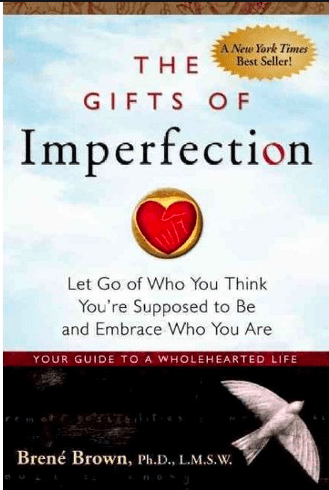
Brene Brown is a researcher, professor, PhD, a mom a wife, an author and her main work revolves around the topics of shame, guilt, vulnerability, authenticity and whole-heartedness. I couldn't imagine a person who wouldn't resonate with some to the examples and situations she brings in this book. Key take-aways / reminders:
- "The opposite of play is not work, but depression. "
- "The common denominator about resilient people is their faith."
- "You can be grateful all the time, but it doesn't mean you are happy and joyful all the time."
- "Pause and breathe before answering."
- "Shame loses it's power when it is talked about."
- "Everyone knows the "how-to" be happy, but not too many talk or think about the things that get in the way of the how-to's."
- "Letting go of what people think. Letting go of perfectionism and comparison."
- "You can be brave, afraid and alive all together."
14. Laura Hillenbrand- “Unbroken”
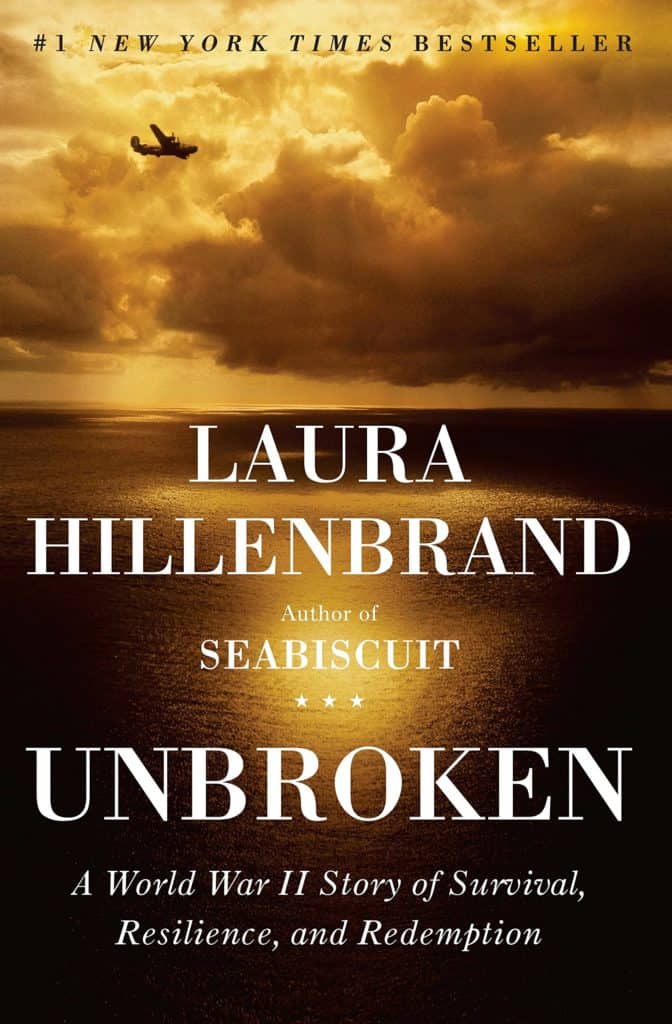
This book is about an olympian Louis Zamperini and his incredible journey through the Second World War. This book is brutal and I literally had to put it away a few times because I just couldn't keep on reading. It's a story about extreme misfortune, cruelty, torture, but also of survival, enormous hope, faith, willpower and forgiveness. Unfortunately it is also the reality of a lot of people gone through the war and the horrific scenarios they've had to face. The author really gives life to the character through her writing and it is extraordinarily moving. Key take-aways/ reminders:
- “Dignity is as essential to human life as water, food, and oxygen. The stubborn retention of it, even in the face of extreme physical hardship, can hold a man's soul in his body long past the point at which the body should have surrendered it.”
- “When he thought of his history, what resonated with him now was not all that he had suffered but the divine love that he believed had intervened to save him.”
- “Finally, I wish to remember the millions of Allied servicemen and prisoners of war who lived the story of the Second World War. Many of these men never came home; many others returned bearing emotional and physical scars that would stay with them for the rest of their lives. I come away from this book with the deepest appreciation for what these men endured, and what they scarified, for the good of humanity. It is to them that this book {Unbroken} is dedicated,” (author)
15. Rachel Hollis- “Girl, Wash your Face”

This book was the 2nd most popular book on Amazon in 2018. The author, Rachel Hollis is a lifestyle influencer, blogger, motivational speaker, media guru and a preacher for women's empowerment. Although her story and what she has build is absolutely incredible, I wasn't too in awe with this book. It probably had to do a lot with this book following "Unbroken" which was just extra impactful for me. Not a big amount of new info, more motivational quotes- type of content, it is still full of great reminders and I deeply admire Rachel for the following and niche she has built and women she has impacted. Key take-aways/ reminders:
- “You, and only you, are ultimately responsible for who you become and how happy you are.”
- “Comparison is the death of joy, and the only person you need to be better than is the one you were yesterday.”
- “The only thing worse than giving up is wishing that you hadn’t.”
- “Decide that you care more about creating your magic and pushing it out into the world than you do about how it will be received.”
- “What I want to say is that we all judge each other, but even though we all do it, that's not an excuse. Judging is still one of the most hurtful, spiteful impulses we own, and our judgments keep us from building a stronger tribe...or having a tribe in the first place. Our judgment prohibits us from beautiful, life-affirming friendships. Our judgment keeps us from connecting in deeper, richer ways because we're too stuck on the surface-level assumptions we've made. Our judging has to stop.”
- “You can survive losing a piece of your heart without losing the core of who you are.”
16. David Goggins- “Can’t Hurt Me”
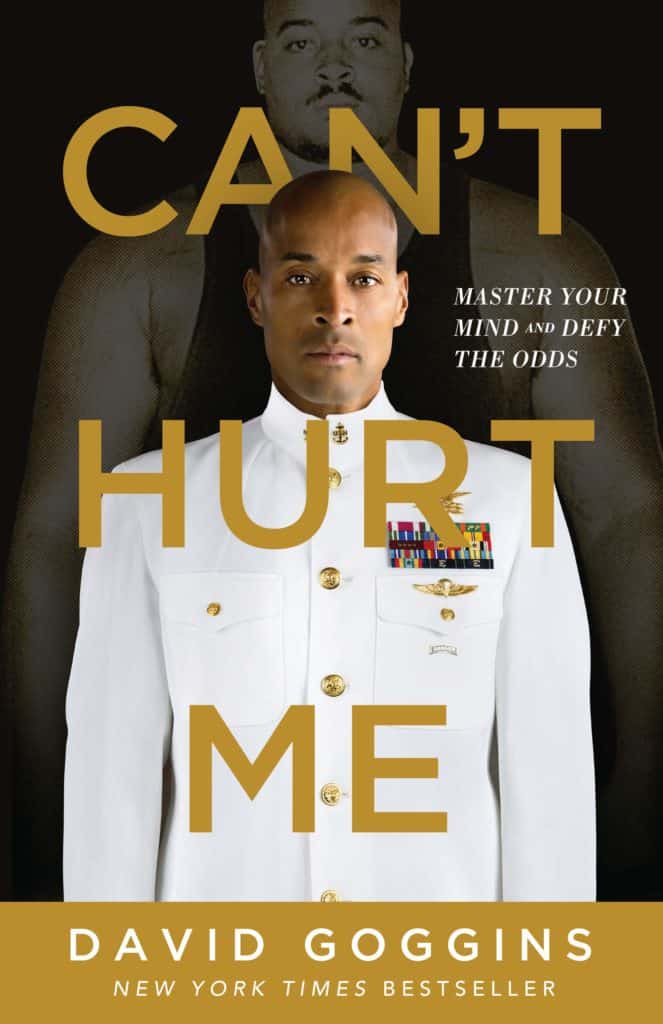
A Navy Seal, an Army Ranger, an ultra marathon runner, a triathlete, motivational speaker, author...who Davig Goggins is, sounds like a super-human. The truth is he came from nothing and is no different than any of us. His childhood was misery- poverty, physical abuse, prejudice. He was overweight for a long time and just cruising through life until he decided that being accepted to military was his number one goal. Eventually he set records for endurance races and army men and became a world-record holder in pull-ups made in a day. This book is about true self-mastery, expanding one's belief and executing on potential. This is not a soft, motivational book, but a hard-core looking into the mirror and facing the things often only we know about ourselves. Key take-aways/ reminders:
- "We have to take OWNERSHIP for everything in our lives."
- "Motivation is crap. It is conditional and sometimes deals you a bad hand. You have to develop habits that don't rely on motivation."
- "We never know what people are going through."
- "Our mind is always looking for a path of least resistance. Our mind knows our fears, our weaknesses, our insecurities. We have to callus our mind to not brings those up."
- "People are afraid to hear what they don't want to hear and we do them a dis-service with continuing that."
17. Marie Forleo- “Everything is Figureoutable”

At the beginning this seemed to me like yet another "self-help" book and I caught myself thinking- "The book title gives you already the main thing you need to take from it." The more it progressed the more it grow on me though. I have definitely now told myself in multiple situation where options seem pretty limited- "Liisa, everything is figuroutable." The book has many great exercises that are impactful once you actually do them along. Key take-aways/ reminders:
- "Try before deny."
- “Do the best you can until you know better. Then when you know better, do better”
- Ask- "How can this work for me?"
- “The most powerful words in the universe are the words you say to yourself.”
- "The art of eliminating excuses means embracing the fact that your dreams aren’t made or broken by anyone but you."
- "Fear is not the enemy. Waiting to stop feeling afraid is."
18. George S. Clason- “Richest Man in Babylon”
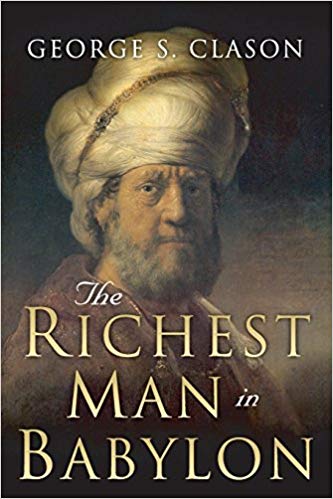
The Ancient Babylonians were the first people to discover the universal laws of prosperity. This book summarises the most fundamental financial truths. Although the book was written in 1920s the principles are the same to the modern investors. Definitely a little unusual, but multilayered tale about business and human accomplishments. Key take-aways/ reminders:
- “Our acts can be no wiser than our thoughts. Our thinking can be no wiser than our understanding”
- “But too often does youth think that age knows only the wisdom of days that are gone, and therefore profits not. But remember this; the sun that shines today is the sun that shone when thy father was born, and will still be shining when thy last grandchild shall pass into the darkness.”
- “That what each of us calls our necessary expenses will always grow to equal our incomes unless we protest to the contrary.”
- “Advice is one thing that is freely given away, but watch that you take only what is worth having.”
19.Viktor E. Frankl “Man’s Search for Meaning”

The author, Viktor E. Frankl was an Austrian neurologist, psychiatrist and a founder of the logo therapy method. He was also a Holocaust survivor and this book is about his experience in the concentration camp. Reading this it was so hard for me to imagine that this was what so many people had to face and millions and millions died of. This book reveals that the meaning of life- no matter what the odds are is always worth living if we know why we want to life. A truth that helped the strongest throughout the inhumane treating and a truth that helps us through everyday challanges- “Those who have a 'why' to live, can bear with almost any 'how'.” Key take-aways/ reminders:
- “When we are no longer able to change a situation, we are challenged to change ourselves.”
- “For the first time in my life I saw the truth as it is set into song by so many poets, proclaimed as the final wisdom by so many thinkers. The truth - that Love is the ultimate and highest goal to which man can aspire. Then I grasped the meaning of the greatest secret that human poetry and human thought and belief have to impart: The salvation of man is through love and in love.”
- “No man should judge unless he asks himself in absolute honesty whether in a similar situation he might not have done the same.”
- “It is well known that humor, more than anything else in the human make-up, can afford an aloofness and an ability to rise above any situation, even if only for a few seconds.”
20. Laura Hillenbrand- “Seabisquit”

Nick has told me since we met, that one day he wants to have a French Bulldog and name him Biscuit. After reading this book I learnt why. The movie "Seabiscuit" used to be one of his favourite ones because of the amazing rags to riches story of the main character- a horse "Seabiscuit." This book about lost souls and belief in oneself, that can make the impossible possible was beautifully and upliftingly written.
- “We had to rebuild him, both mentally and physically, but you don't have to rebuild the heart when it's already there, big as all outdoors.”
- “Horses stay the same from the day they are born until the day they die. . . . They are only changed by the way people treat them.”
As you can see most of the books that I read I am extremely excited about and learnt as ton. Two reasons for that. I research what I read quite a bit and I believe there is no such thing as a "bad book" there is just "inability to be open-minded."

People prefer very different type of writing and book styles, so your experience reading some of these might be very different. Just sharing what connected with me.
2020 read books so far:
- Robert Eiger- "The Ride of a Lifetime"
- Brene Brown- "Dare to Lead"
- James Clear- "Atomic Habits"
- Gary Keller- "The One Thing"
- Kobe Bryan- "Mamba Mentality"
Reviews for those coming up.... next year:D
I am always looking for new books, so leave your favourite suggestions in the comments.
Until the next time...
Love,
Liisa.

